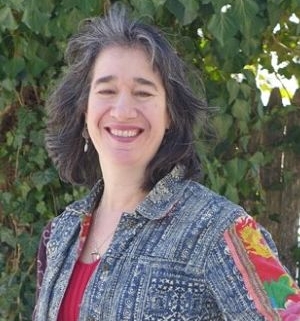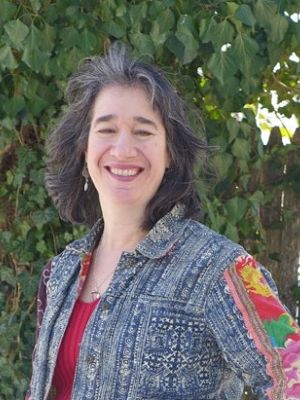She’s Not There
“Your mother’s your slave,” a girl in the playground taunted.
“Is not!” I insisted, but even at six years old, I recognized the truth in her words.
My mom pulled socks on my feet while I lay in bed to save me from the shock of cold tile, read to me in the bathroom when I had trouble going, brought sweaters out to whatever stoop I’d landed on instead of calling me home.
Meanwhile, my mom did none of this for my sister. She spat Andra’s name. She screeched with anger. A curse or lie slipped from twelve-year-old Andra’s lips and she’d have to kneel in the kitchen, the cutout specks in the linoleum patterning her knees.
* * *
“Where’s-my-sis-ter?” I chanted one afternoon, bouncing a pink ball in rhythm.
My mom kept browsing The Pennysaver. “Probably out with friends.”
Andra didn’t show up for supper, or after I finished my homework, or when I sat with my dad while he watched Gunsmoke. Outside, night had spilled all of its ink.
“She’s always home by now. She should be here.”
“You’re right,” my dad answered. “She should.”
* * *
After that, Andra left often. Even when she pinky swore she wouldn’t. Even after we watched Dorothy tell Auntie Em there’s no place like home.
* * *
At home, Andra taught me to draw girls with slants of hair covering one eye. She explained why Fred Flintstone wore dresses and kept a pet dinosaur.
“Don’t tell,” she’d say, lighting a Kool in our hideout behind the garage.
Shaping her mouth into the O from my name, she sent bracelets of smoke skyward. I watched them spread and disappear.
* * *
The next time Andra returned from wherever runaways go, my parents threatened to send her away. “There are special schools for girls who keep looking for trouble.”
It seemed upside down to me. Why banish someone whose worst offense was leaving?
* * *
Eventually, Andra was sent to what was described to me as a girls’ boarding school in upstate New York. I pictured a line of teenagers standing frozen in a row like Barbies at the toy store.
When we finally visited, we sat at a picnic table surrounded by trees and distant mountains. Andra probably told us something about her days there, but her words are as lost to me as the dialogue on the silent screen at the drive-in across from our motel. All I recall is needing to touch my sister, pushing her hair back from her pretty face.
* * *
A decade later, Andra visited me on my own grassy campus. I was eighteen, studying poetry and women’s literature.
“Well, excuse me, Miss Educated,” Andra quipped when I claimed to practically live at the library.
“Schoolwork,” I mumbled, glancing away. I couldn’t articulate that reading was how I escaped the painful imbalances at home.
Miss Educated. Listening back through the years, I can hear pride beneath her teasing. But at the time, it felt like an indictment. Who was I to move so far past the sister I once worshipped? Her education ended in eighth grade at the school I didn’t yet know wasn’t a school at all.
I also didn’t know that when Andra arrived there, at thirteen, she’d already reached what for her would be late middle age. She died suddenly and violently the year after our stroll through my college campus.
* * *
It took thirty years—both parents gone, my own child a teenager—before I thought to call the library in Hudson, New York.
“My sister attended a boarding school in your town in 1970. Would you know what the name of it might’ve been?”
Hearing the word reformatory, my breath caught in my throat. That pretty campus had been a lockup. I wondered what crime Andra could’ve possibly committed. Then I read about the Wayward Minor Act, which allowed the incarceration of children for deeds no more serious than skipping school or running away from an unlivable home. Under this state law, parents could bring charges against their kids simply for being difficult, simply for being kids.
* * *
The New York State Training School for Girls. The focus wasn’t on education, but on discipline and keeping the twelve to sixteen-year-old inmates sealed off from the world. Inside, they faced forced labor, violence, sexual abuse, and long stretches in solitary.
Throw adolescents together and they can be relentlessly cruel. Thankfully, they can also be loving and fiercely loyal. Training School girls fell in love, held wedding ceremonies, claimed other inmates as their children. The families they formed could be as rough as street gangs, but also caring and protective in ways many, including Andra, never experienced at home.
* * *
“Don’t tell,” Andra often made me promise. I never did, but I also never asked.
Where were you, I’m asking now. What happened there? What got you through?
Without her here to answer, I turn to school and court records, case studies in yellowed books, memoirs by women who were once incarcerated girls—reading, finally, not to escape, but to bear witness.
“About time, Miss Educated,” I hear my sister say.


 Ona Gritz’s essays have appeared in The New York Times, The Guardian, The Utne Reader, MORE magazine, and elsewhere. “It’s Time,” which appeared in The Rumpus, was named a Notable Essay in Best American Essays, 2016. Ona’s books include the memoir On the Whole: A Story of Mothering and Disability, and the poetry collections Geode, and Border Songs: A Conversation in Poems, written with her husband, Daniel Simpson.
Ona Gritz’s essays have appeared in The New York Times, The Guardian, The Utne Reader, MORE magazine, and elsewhere. “It’s Time,” which appeared in The Rumpus, was named a Notable Essay in Best American Essays, 2016. Ona’s books include the memoir On the Whole: A Story of Mothering and Disability, and the poetry collections Geode, and Border Songs: A Conversation in Poems, written with her husband, Daniel Simpson.


